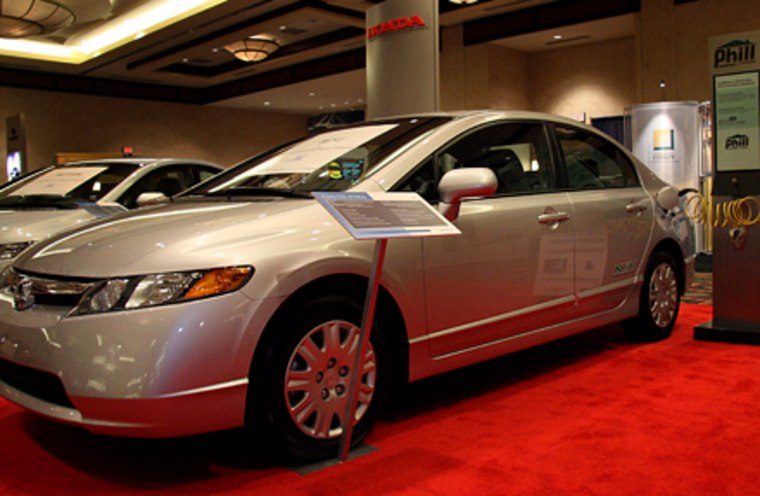As gasoline prices soar, vehicles powered by natural gas are capturing more attention, especially among those operating heavy vehicles.
Compressed natural gas, or CNG, has an average-per-gallon equivalent price that's one third that of gasoline, Richard Kolodziej, president of Natural Gas Vehicles for America, said at a tradeshow here on alternative energy vehicles. And CNG is much cheaper in some areas — like Oklahoma, where it's about 91 cents a gallon equivalent — he said.
Kolodziej said the growing gap between the cost of oil and natural gas and public policy shifts toward alternative fuels bode well for the natural gas vehicle industry, as does the large supply of natural gas. He said 97 percent of the natural gas used in the U.S. is produced in North America.
"Natural gas vehicles help achieve three major public policy goals simultaneously," Kolodziej said. "They produce less greenhouse gases, reduce air pollution and displace the use of foreign oil, and CNG is far cheaper than gasoline or diesel fuel."
Still mostly heavy vehicles
The cost of natural gas vehicles also is becoming more competitive, he said, noting that 130,000 such vehicles are in use in the U.S. now. That number has grown slowly in recent years, but he noted many of the newer natural gas vehicles are large trucks and buses used in urban areas.
He said the focus of his organization has been on encouraging the use of natural gas in such vehicles, as well as airport vehicles, delivery vehicles, taxis and commuter vehicles.
Tom Price, the senior vice president of corporate development at Chesapeake Energy — which hosted the conference — said rising gasoline prices especially affect organizations that use heavy vehicles.
"Fleet managers are struggling to keep their fleets operating at peak efficiency and rising fuel prices are impacting the cost of virtually every consumer product," Price said.
Oklahoma City-based Chesapeake Energy is the third-largest overall producer of natural gas in the U.S.
While nations like Argentina, Pakistan and Brazil all have more than 1.4 million natural gas vehicles on the road, it's been more difficult to increase the U.S. usage numbers because, until recently, oil prices in the U.S. were relatively inexpensive, said David Gelman, the vice president of New West Technologies, who has been involved in the alternative fuel industry since 1985.
"There's no question now that the majority of the applications for natural gas now are still in centralized fleets," Gelman said.
"For us to deal with this issue, everybody has got to change their mind-set that you're going to have one fuel choice. The idea is, you might have five or six. The question is, which one makes sense for which part of the country, which one makes sense for which type of application."
1,300 fueling stations in U.S.
There are about 1,300 natural gas fueling stations in the U.S., with the heaviest clusters in California, Kolodziej said.
But Kolodziej said there is only one mass-market natural gas car sold in the U.S., the Honda Civic GX, and that's sold only in New York and California for now. Only a few hundred are produced each year.
The vehicle is eligible for a $4,000 federal tax credit and buyers can also purchase a $2,000 home refueling station.
The model sells for around $25,000 — about $6,000 more than a comparable gasoline-powered Civic.
Another downside beyond the upfront cost is that natural gas cars require a larger fuel storage container, usually placed inside the trunk.
Honda says the GX achieves an EPA estimated city/highway fuel economy of 24/36 miles per gasoline-gallon equivalent.
It adds that the GX is the only vehicle certified by the EPA to meet the strictest emission standards.
